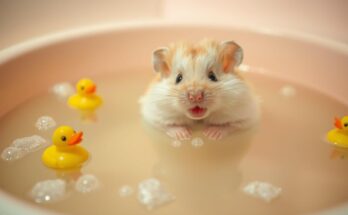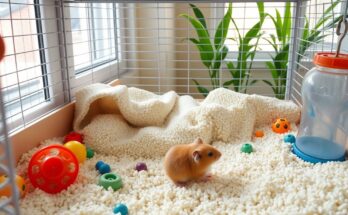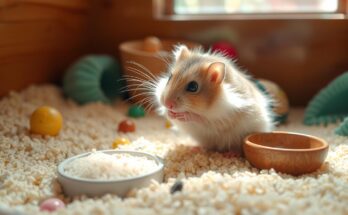Understanding why hamsters eat their poop can be both fascinating and confusing for many pet owners. This seemingly odd behavior, known as coprophagy, is essential to their digestive process and overall health. Let’s delve into this topic to understand our furry friends better.
Introduction: A Curious Habit
When you first notice your hamster eating its poop, it might seem alarming. However, this behavior is entirely normal and even beneficial for your pet. This article will explore the reasons behind this behavior, its benefits, and what it means for your hamster’s health.
The Nature of Hamsters: Natural Behaviors
Like many small animals, hamsters have unique behaviors crucial for their survival and well-being. Coprophagy is one such behavior, deeply rooted in their instincts. This instinctual behavior ensures they make the most of the food they consume, an essential adaptation for their survival in the wild.
Understanding Coprophagy: What Is It?
Coprophagy is the act of consuming feces. While it may sound unpleasant, it plays a significant role in the dietary habits of many small animals, including hamsters. Coprophagy allows hamsters to extract maximum nutritional value from their food, which is especially important given their small size and high metabolism.
Nutrient Reabsorption: The Primary Reason
The primary reason hamsters eat their poop is nutrient reabsorption. Their digestive systems could be more efficient at extracting all the nutrients from their food the first time around. Eating their feces gives their bodies a second chance to absorb these essential nutrients. This process ensures they receive the necessary vitamins and minerals for their health.
The Two Types of Hamster Feces
Hamsters produce two types of feces: solid and soft. The soft feces, often eaten, contain a high level of nutrients and beneficial bacteria that aid digestion. These soft droppings are usually produced at night and are rich in nutrients such as Vitamin B12 and other essential vitamins and minerals.
Digestive Health: Enhancing Gut Flora
Eating their feces helps hamsters maintain a healthy gut flora. The beneficial bacteria in the soft feces support their digestive health, preventing diarrhea and bloating. This bacterial balance is crucial for their overall well-being and helps break down complex carbohydrates and fibers in their diet.
Vitamin B12 Synthesis
One of the critical nutrients reabsorbed through coprophagy is Vitamin B12. This vitamin is essential for energy production and maintaining healthy nervous system function in hamsters. Without the reabsorption of this vitamin, hamsters could suffer from energy deficiencies and neurological problems.
Protein Intake
Hamsters also reabsorb proteins through coprophagy, which is crucial for growth, repair, and overall bodily functions. Proteins are the building blocks of life, and for small animals like hamsters, ensuring they get enough protein is vital for their development and maintenance of muscle mass.
Instinctual Behavior: Survival Mechanism
In the wild, coprophagy is a survival mechanism. It ensures that hamsters make the most of their limited food sources, especially in harsh environments where food may be scarce. This behavior is ingrained in their genetics and is an essential aspect of their natural diet.
Behavioral Observations: What to Look For
Observing your hamster’s eating habits can provide insights into their health. Regular consumption of feces is average, but excessive eating may indicate a dietary imbalance or health issue. If you notice a significant increase in this behavior, it’s worth evaluating their diet and consulting a veterinarian.
Diet and Coprophagy: The Connection
A balanced diet can reduce the need for coprophagy. Ensure your hamster receives a well-rounded diet of fibers, proteins, vitamins, and minerals. Providing fresh vegetables, high-quality hamster pellets, and occasional fruits can help meet their nutritional needs.
Impact of Coprophagy on Hamster Health
Regular coprophagy contributes to overall health and well-being. It helps maintain a robust immune system, better digestion, and nutrient absorption. Hamsters that engage in this behavior typically exhibit healthy coats, active behavior, and a good appetite.
Caring for Your Hamster: Hygiene and Environment
Maintaining a clean environment is essential. While coprophagy is normal, excessive feces in the cage can lead to hygiene issues and potential health risks. Regular cleaning of the cage and proper bedding can help maintain a healthy living environment for your hamster.
Common Misconceptions
Many new hamster owners mistake coprophagy for a sign of poor health or inadequate care. Understanding this natural behavior is crucial in providing the best care for your pet. Educating yourself on normal hamster behaviors is essential to avoid unnecessary concerns.
Veterinary Insights: When to Seek Help
If you notice any changes in your hamster’s eating habits or feces consumption, it’s wise to consult a veterinarian. They can rule out potential health issues and provide dietary recommendations. Regular check-ups can also help monitor your hamster’s overall health and well-being.
The Evolutionary Perspective: Why Some Animals Eat Their Feces
To fully appreciate why hamsters engage in coprophagy, it’s helpful to consider the evolutionary perspective. Many small animals exhibit this behavior, including rabbits, guinea pigs, and some rodents. It is an adaptive trait that has evolved to maximize nutrient absorption from their diet, often low in easily digestible nutrients.
The Role of the Cecum in Hamster Digestion
The cecum is a crucial part of the hamster’s digestive system. It acts as a fermentation chamber where bacteria break down fibrous plant material. The soft feces produced contain partially digested food and bacteria, making them nutrient-rich. When hamsters eat these droppings, they effectively complete digestion, ensuring no valuable nutrients are wasted.
Comparing Hamster Digestion to Other Animals
Hamsters’ digestive systems share similarities with other small herbivores. For instance, rabbits also produce feces: cecotropes (nutrient-rich droppings) and regular waste. This comparison highlights the efficiency of coprophagy as a means to optimize nutrient intake from plant-based diets.
Common Dietary Imbalances Leading to Excessive Coprophagy
While coprophagy is normal, excessive engagement can indicate dietary imbalances. Common issues include:
- Lack of Fiber: Insufficient fiber can disrupt normal digestion, prompting more frequent coprophagy.
- Low Protein: Protein-deficient diets may cause hamsters to consume more feces to meet their nutritional needs.
- Vitamin Deficiencies: A lack of essential vitamins, especially B12, can increase feces consumption.
Ensuring a Balanced Diet for Your Hamster
To promote optimal health and minimize excessive coprophagy, provide a balanced diet. Here are some tips:
- High-Quality Pellets: Choose pellets formulated explicitly for hamsters, ensuring they contain the right balance of nutrients.
- Fresh Vegetables: Offer a variety of fresh vegetables daily, such as carrots, broccoli, and kale, to provide essential vitamins and minerals.
- Occasional Fruits: While fruits are a good source of vitamins, they should be given sparingly due to their high sugar content. Apples, berries, and bananas are good options.
- Fresh Water: Always ensure your hamster can access clean, fresh water.
Monitoring Your Hamster’s Health
Regularly monitoring your hamster’s behavior and physical condition is crucial. Look for signs of good health, including:
- Active Behavior: Healthy hamsters are typically active and curious.
- Shiny Coat: A glossy, smooth coat indicates good nutrition and overall health.
- Clear Eyes and Nose: No eye or nose discharge suggests a healthy respiratory system.
- Normal Feces: Regular, well-formed droppings signify a healthy digestive system.
Addressing Potential Health Issues
Consult a veterinarian if you observe any concerning changes in your hamster’s behavior or health. Potential issues to watch for include:
- Weight Loss: Unexplained weight loss can indicate underlying health problems.
- Lethargy: Reduced activity levels may signal illness or nutritional deficiencies.
- Diarrhea: Persistent diarrhea can lead to dehydration and requires prompt veterinary attention.
Creating an Enriching Environment
An enriching environment can significantly impact your hamster’s overall well-being. Consider the following elements:
- Spacious Cage: Ensure the cage is spacious enough for your hamster to move freely.
- Exercise Wheel: A wheel provides necessary physical activity, helping to prevent obesity and boredom.
- Tunnels and Hideouts: These elements mimic natural habitats and provide mental stimulation.
- Chew Toys: Chew toys help maintain dental health, preventing overgrowth of teeth.
The Importance of Regular Cage Cleaning
Maintaining a clean living environment is vital for your hamster’s health. Follow these cleaning tips:
- Daily Spot Cleaning: Remove soiled bedding and uneaten food daily.
- Weekly Deep Cleaning: Conduct a thorough cage cleaning once weekly, replacing all bedding and disinfecting surfaces.
- Safe Cleaning Products: Use pet-safe cleaning products to avoid harmful chemicals.
Understanding and Supporting Natural Behaviors
Understanding your hamster’s natural behaviors, including coprophagy, allows you to provide better care. Support these behaviors by:
- Providing a Balanced Diet: Ensure your hamster receives all necessary nutrients through a varied diet.
- Encouraging Natural Behaviors: Allow your hamster to engage in natural behaviors like digging and foraging by providing appropriate materials.
- Regular Veterinary Care: Schedule regular veterinary check-ups to monitor your hamster’s health and address any issues promptly.
The Social Nature of Hamsters
While hamsters are often solitary animals, understanding their social nature is essential. Some species, like Syrian hamsters, prefer to live alone, while others, like dwarf hamsters, may enjoy the company of their kind. Recognizing these social preferences helps in creating a comfortable environment for your pet.
Signs of a Healthy Hamster
Identifying signs of a healthy hamster ensures you are providing the best care. These signs include:
- Bright Eyes: Clear, bright eyes without any discharge.
- Smooth Fur: A smooth, glossy coat free from bald patches or sores.
- Active and Curious: Regular activity and curiosity about their surroundings.
- Normal Appetite: Consistent eating habits and a healthy appetite.
Addressing Behavioral Changes
If you notice any changes in your hamster’s behavior, such as increased aggression, lethargy, or changes in eating habits, it’s essential to investigate further. These changes can be indicators of stress, illness, or environmental issues.
Common Health Issues in Hamsters
Hamsters can suffer from various health issues, including:
- Respiratory Infections: Symptoms include sneezing, wheezing, and nasal discharge.
- Wet Tail: A severe condition causing diarrhea and dehydration.
- Skin Issues: Mites or fungal infections can cause skin irritation and hair loss.
- Dental Problems: Overgrown teeth can lead to difficulty eating and weight loss.
Preventative Health Measures
Taking preventative measures can help avoid many common health issues. These include:
- Balanced Diet: Ensure your hamster receives a nutritionally complete diet.
- Clean Environment: Maintain a clean cage to prevent infections and respiratory issues.
- Regular Exercise: Provide opportunities for physical activity to prevent obesity.
- Veterinary Care: Schedule regular check-ups and address health concerns promptly.
Understanding Your Hamster’s Communication
Hamsters communicate through various behaviors and sounds. Understanding these can help you respond appropriately to their needs. Typical forms of communication include:
- Squeaking: Can indicate excitement, fear, or pain.
- Chattering Teeth: Often a sign of agitation or stress.
- Body Language: Posture and movements can indicate contentment, curiosity, or discomfort.
FAQs: Addressing Common Questions
1. Is it normal for my hamster to eat its poop?
Yes, it is entirely normal and beneficial for their health.
2. What nutrients do hamsters reabsorb from their feces?
Primarily Vitamin B12, proteins, and beneficial bacteria.
3. Should I change my hamster’s diet if it eats its poop?
Not necessarily. Ensure a balanced diet; coprophagy is a natural behavior.
4. Can coprophagy indicate a health issue?
Excessive coprophagy might occur, so monitor their behavior and consult a vet if you are concerned.
5. How can I ensure my hamster stays healthy?
Provide a balanced diet, a clean environment, and regular vet check-ups.
6. Is there a difference between the types of feces my hamster produces?
Soft feces are nutrient-rich and often consumed, while solid feces are waste.
7. Can coprophagy affect my hamster’s lifespan?
When done typically, it positively impacts their health and longevity.
8. Should I prevent my hamster from eating its poop?
No, it’s a natural and beneficial behavior.
Conclusion
Understanding why hamsters eat their poop can help you provide better care for your pet. This natural behavior is essential for their health, and by ensuring they have a balanced diet and clean environment, you can support their well-being. Embrace this aspect of hamster care, knowing it signifies their unique and fascinating biology.


